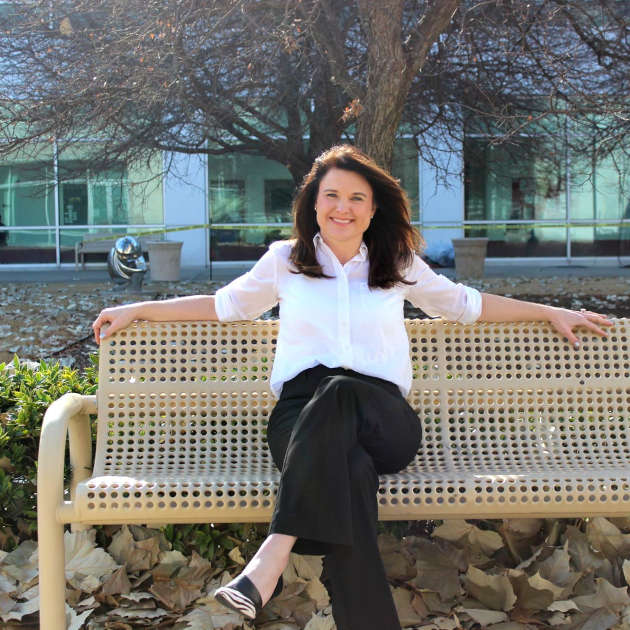Contents
- JSOM: What led you to a career in ITS?
- Describe more about your career and the industry.
- What do you like best about teaching?
- What interests take up your free time?
- What do you tell your students about how to stand out in IT —- it’s such a competitive field?
- Is becoming a problem solver the secret to embracing change?
- What else do you want the students to know about you?
- I noticed that you’re a part of an organization with women in tech. Can you talk about that a little bit?
- Do you think intimidation is part of the whole thing?
- How can they reduce that intimidation feeling or even eliminate it altogether?
- I saw your Toastmaster faculty advisor certificate. What can Toastmasters do, and what’s your role as a faculty advisor?

We’re here with Dr. Dawn Owens, Clinical Assistant Professor; Director of the BS in ITS program, to answer a few questions on her background and share some of her advice to JSOM students.
JSOM: What led you to a career in ITS?
Owens: When I was in school, college, my undergraduate degree, I originally thought I wanted to do accounting. … I loved working with numbers, and I loved solving problems. I went to see an academic advisor in the school of management where I was taking most of my classes and spoke with him about what I was interested in. I just wasn’t feeling it with accounting.
I said, “These are the things I’m interested in: I love solving problems, working with numbers, and I do like to fiddle with computers a little bit.”
He said, “Well, I think you might be interested in a degree we call management of information system or information systems,” — which is the commonly referred to name of this degree in most schools of management.
I said, “Sure, I would be very interested in that. I’m going to check it out.”
So I decided to change my major, and I never looked back. In terms of the classes, the ones I took as an undergrad were very similar to the ones our students take. Systems analysis, database management, programming, all those [courses] that I had to take as a student.
I was not fond of programming; still today, most students are not, But I realized that in order to be in this [field] you have to know all aspects of it. And I did programming for a little while in my career. I’m so glad that I chose the field that I did, and I’m so glad my advisor advised me about this degree plan, because that’s probably the No. 1 issue we have today. Still today, most students, or a lot of students, don’t know that this degree plan exists.
Describe more about your career and the industry.
I worked in the industry for about 13 years before transitioning to teaching full time. My first job out of college was as a programmer for several years. Then I was fortunate enough that the company I was working for was relatively small in terms of [its] IT department, which gave me the opportunity to do lots of different things not in my title. I was able to work with all kinds of technology, and as a result, I learned very quickly. I did a lot of different things, so I was quickly promoted to assistant analyst, which provided me with more responsibilities, and I got to work on designing systems and work with customers.
In that role, I did database administrative tasks, and then I was also assistant administrator. Then I started to get into some leadership roles. I became a project manager, where I was managing multiple projects and working with various customers/teams.
After that, I became a manager of a team. I did that for a couple years and then became the director of multiple teams. I was well on my way to be a VP, or even higher in the company.
That all changed when I started my master’s degree program. I finished that really quickly, and then I decided to teach a couple classes part time at the university. I did that and knew right away that that was what I wanted to do full time. When I started teaching I said, “You know what, my goal’s changed. I want to teach full time.” Instead of mapping out a plan to become a VP, I had a plan to go back to school, get my PhD and pursue a full-time teaching position.
What do you like best about teaching?
What I like best is interacting with students. I love to learn from them. One of the things about teaching is that if you’re going to teach something, you have to know it inside and out. The other thing I like about teaching is that I’m constantly learning, looking for ways to be more in tune with the materials and the students, changing my teaching methods.
What interests take up your free time?
I do have a family. I have three kids, a 12-year-old, a 10-year-old and a 6-year-old; so they take up a lot of my time. I also have three dogs; so I’m very involved in the Greyhound Adoption League of Texas. I’m responsible for updating their website. We also foster dogs —- greyhounds, and help them get placed into full-time homes. All three of my kids play the piano, and so do I. I also like to run, and I recently started taking tap-dance lessons. These are the things that keep me busy.
What do you tell your students about how to stand out in IT —- it’s such a competitive field?
One of the biggest challenges in this field specifically is change. IT is really the driver of a lot of the changes that we see in business today, and so that’s really a challenge for students, but also an opportunity. In terms of advice for undergraduate students, it’s that you need to be able to embrace change, to look at change and be able to see the opportunities.
The other thing that I tell my students is to be a problem solver, not a problem spotter. What I mean by that is a lot of people are very quick to spot a problem then walk away. But the students who are going to stand out and have a competitive edge are going to say, “OK, I spot a problem,” then take one step further and propose a solution.
Is becoming a problem solver the secret to embracing change?
Uh-huh. So again, embracing change. Ironically, if you look at my strengths — a list of all 34 of my strengths — I can see the No. 1 and then the bottom one. The last one is adaptability. Kind of ironic, but I think the key is whether you like change or not. Being able to embrace change, looking for opportunities, not seeing change as a problem, but using it as an opportunity to make things better is really how you’re going to be different.
What else do you want the students to know about you?
One of the things that I’d like to tell my students is, “Don’t be afraid to try new things.” So many students think that OK, they’re going to choose a career, and this is the end and beyond, but it’s not. There are so many things that you can do, and don’t let age, gender, race, culture stop you from doing anything. … Look at me: I decided to change my career goal later in my life, and I think I’ve been very successful with that. I didn’t let my age or my time in life stop me from doing things that I really wanted to do. So my inspiration to students is to try new things, and don’t let somebody else or what you think other people think of you stop you from doing what you want to do.
I noticed that you’re a part of an organization with women in tech. Can you talk about that a little bit?
Sure! When I was going to school in my undergraduate degree, I was probably one of the only females in my ITS classes. What are the challenges? Of course I made the most out of that opportunity. When I started working, one of the challenges I faced was that again, I was one of the only females in my department. I wasn’t the only one, but I was one of two in a department of 40. It became very evident to me that women were very underrepresented in this field. … It wasn’t just that, but it was just the way that I felt when the guys would go golfing. I golf, but they didn’t include me.
My passion is really for women to feel comfortable in this field and not feel isolated. That’s one of the reasons why I’m so passionate about females and the STEM arena. They’re very underrepresented, and a lot of times they get into it then leave because there’re so few of them, or they don’t see the success that women have in the field, and they don’t pursue it. So again, my reason for starting the Women in IT organization was really to help provide opportunities for students, for females in the field, encourage them. What we do is we try to bring in other women who have been successful in this field to show how they got to where they are and to give them tips and things like that.
Do you think intimidation is part of the whole thing?
Uh-huh. I think intimidation plays a role in it. …. Here at UT Dallas, 25 percent of the students in our program are female. For them, they’re going to walk in and be one of the handful of females in the classroom. That can be intimidating.
How can they reduce that intimidation feeling or even eliminate it altogether?
I think the key is to get connected with other females in the field and then also be confident about your abilities. An area where women struggle is having confidence in their abilities. They may be confident internally, but they may be afraid to express it, or just not be confident in general. So that’s very important. When you walk into the room, you have the confidence to say, “OK, I’m the only female in the room. Lucky me.”
I saw your Toastmaster faculty advisor certificate. What can Toastmasters do, and what’s your role as a faculty advisor?
Real quick: One thing I’m really excited about is I was recently elected as the co-chair of the AIS (Association for Information Systems) Women’s Network. It’s a national organization made up of primarily female faculty from around the nation. So I’m very excited about what that will bring and what I can do there.
In terms of Toastmasters, I am the faculty advisor of one of the many Toastmasters groups here at UT Dallas. I’ve had students come to me really intimidated about standing and talking in front of people, or maybe they feel they can talk to people, but they don’t have that confidence.
So Toastmasters is a really good way for people to build confidence because in the organization, you’re speaking in front of people and then get immediate feedback. So you get evaluated for your speeches. They tell you the good things you did and things you could work on in a positive way. I’ve seen so many people grow as a result of that. I’m also the assistant to the division director — helping with competitions, attending various leadership training events and things of that nature.
*****
Transcribed by Linh P. Nguyen.





